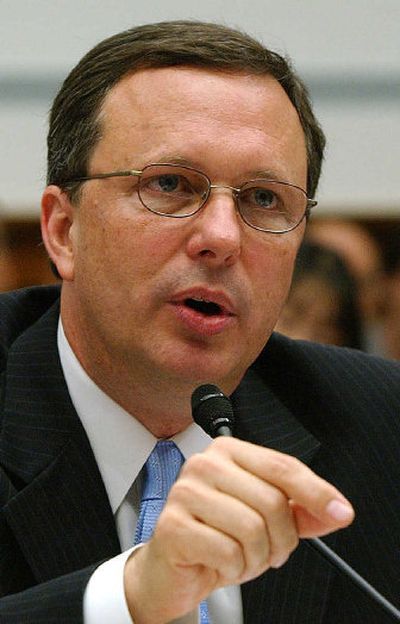Ex-FEMA boss says he made mistakes

Mammoth Lakes, Calif. Former FEMA Director Michael Brown on Wednesday accepted a greater share of the blame for the government’s failures after Hurricane Katrina, saying he fell short in conveying the magnitude of the disaster and calling for help.
“I should have asked for the military sooner. I should have demanded the military sooner,” Brown told a gathering of meteorologists at a ski resort in the Sierra Nevada.
“It was beyond the capacity of the state and local governments, and it was beyond the capacity of FEMA,” said Brown, former head of the Federal Emergency Management Agency.
Brown’s remarks Wednesday stood in contrast to his testimony at a congressional hearing in September, when he blamed most of the government’s failures on Louisiana Gov. Kathleen Blanco and New Orleans Mayor Ray Nagin, both Democrats.
He specifically targeted them for failing to evacuate New Orleans, restore order and improve communication.
“These are not FEMA roles,” Brown told the congressional committee. “FEMA doesn’t evacuate communities. FEMA does not do law enforcement. FEMA does not do communications.”
In an interview after his speech Wednesday, Brown said: “I think it’s important to realize that all of us made mistakes. … After a while you get a different perspective.”
He added: “I still do believe that things weren’t working too well down there.”
He also told the gathering of broadcast and National Weather Service meteorologists that he failed to delegate responsibility, saying he tried to attend to the details himself.
“It was the largest natural disaster ever to strike the United States – 92,000 square miles. Logistics were falling apart,” he said.
Beaten girl responds to medical stimuli
Springfield, Mass. A comatose girl beaten with a baseball bat is responding to medical stimuli, officials said Wednesday, a day after Massachusetts’ highest court ruled the state could take her off life support.
The state, which has custody, had asked that Haleigh Poutre’s ventilator and feeding tube be withdrawn after doctors said she was in an irreversible vegetative state.
But state officials wanted more tests of the 11-year-old girl’s condition before life support was withheld.
“There’s a possible change in her condition,” Denise Monteiro, a spokeswoman for the Department of Social Services, said Wednesday. “She’s having some responses.”
The girl’s stepfather, Jason Strickland is already charged with beating the girl and could face a murder charge if she dies. He has fought to keep her on life support, but the Supreme Judicial Court ruled against him Tuesday.
Flu would hit Alaska first, scientists say
If bird flu arrives in North America, scientists expect to find it first in Alaska, the breeding ground for many migratory birds from Asia, scientists say.
The bird flu virus, known as H5N1, is the culmination of random mutations and countless viral mixings, producing a strain of influenza completely unfamiliar to the human immune system. It could be just a few more mutations away from being able to easily infect and spread among people – the raw ingredients needed to spark a global pandemic. Or it could evolve into a harmless strain.
Governments have slaughtered millions of chickens and other poultry. Hospitals are stockpiling Tamiflu and other antiviral medications. Scientists are racing to develop a vaccine.
In Alaska, scientists are searching for traces of H5N1 in bird droppings left from the summer breeding season. They could be preserved in now-frozen water or soil.
“It’s just a matter of time before H5N1 shows up everywhere,” said George Happ, a biologist at the University of Alaska.